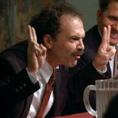I took an Introduction to American Politics honors class with Professor John J. Pitney this past semester. He is a masterful teacher and this post will capture the lessons I drew on how to effectively engage a class. I hope it’s useful for other teachers reading this.
Be respected as an authority on the material: In any place where students are intellectually curious, they first want to be assured that you know your stuff. At most good high schools or colleges, it’s assumed teachers know the material. But effective teachers will provide background on how and why they know what they’re talking about. As students, we’re trained to be skeptical, so convince us.
Tell stories. This is a universal Good Thing for effective communicating, no less in formal teaching. His stories are all the more vivid since he was there (earlier in his career) — in D.C., in Albany, in the back room, wherever. 1) Make a statement, 2) Illustrate with a story, 3) Repeat.
Be weird and wacky. Pitney stomped and jumped all over the classroom. He did weird impersonations. He raised his voice, lowered his voice. He laughed. He showed odd videos. All this made him memorable. Weird is good.
 Get personal. He sent us a picture of him and his son over Halloween; he told us stories about family; he opened up. We relate to warm, human beings more than we do to cold, only-business PhDs.
Get personal. He sent us a picture of him and his son over Halloween; he told us stories about family; he opened up. We relate to warm, human beings more than we do to cold, only-business PhDs.
Send email and write a blog – In short, communicate on grounds most comfortable to students, namely the internet. The primary out-of-class communication channel was email. The class had a blog to which we had to post.
Ask for feedback half-way into the semester. He requested anonymous feedback from students on how the course could be improved. It’s astonishing that teachers don’t take student feedback on teaching more seriously: by the time a student’s in college, he’s been exposed to dozens of teachers and varying styles. We have ideas. Consider them. Instead of waiting till the end of the semester, Pitney asked for it early on so he could incorporate the feedback while still teaching us.
Don’t listen to all the student feedback – have non-negotiables. He calls at students at random to answer questions. This makes students uncomfortable and people ask that he not do it, but he says, "I’m preparing you for the real world. People are going to call on you. People are going to make you uncomfortable." Or he obsesses about following Strunk and White writing style. People complain (I, for example, think he should note that minimalist writing is one kind of writing but not always the best). He doesn’t listen to us. He sticks to his principles.
Close each class with questions for next time. Each class ended with, "Next time we’ll discuss X, Y, and Z. Think about the following. [Insert three rhetorical questions here.]" This gets students thinking — even if at an unconscious level — about the next class meeting.
Allow students to personalize the course. Each class opened with, "Anything for the good of the order?" This was an opportunity for students to say something on their mind. Or most frequently, to comment on a story in the news. For essays, he provided multiple topic options and always allowed students to propose their own.
Be knowledgeable about the institution. Pitney knew the College well. If a topic fell outside his area of expertise, he referred us to another member of the faculty.
Let your emotion and passion show. At good liberal arts colleges, the professors love teaching. They’re passionate about it. Pitney displayed this energy at every turn. On the last class of the semester, he closed saying, "I’m going to end this course the way I’ve ended every class I’ve taught since grad school. I’m going to read a brief quote from A Man for All Seasons." His voice started to crack, and he read the quote:
God made the angels to show him splendor, as he made animals for innocence and plants for their simplicity. But man he made to serve him wittily in the tangle of his mind.
And without another word, he picked up his bag and left. For a few seconds, the class sat silently, contemplating the suddenness with which the class had come to a close. There was an unspoken consensus: We had been in the presence of a master.
Hi Ben,
Great post. I agree with your observations. One of the things that bothered me a bit through undergrad was the lack of classroom participation in the early stages of a new course. However, great teachers find a way to invite participation, either through the random “call out” of those not engaged, or beginning each class with current events discussions to show how the class ties into the real world.
I’m curious to know (in your first semester observations), how many students at Claremont sleep during class?
This was a problem during my time at the Academy (mainly because of the workload); however, I wonder if this is a problem everywhere.
Have a nice Christmas!
Through college, med school, and residency there were professors who clearly stood out. When I think back, they did many of the things you recommend here. It is those 20% who had a significant impact me and helped me to succeed.
Thank you Drs. Jack Colby, Peter Monti, David Lewis, Diane Lipscome, Pat Ober, Steve Feldman, Joseph Jorizzo, Gary Cole, and Christopher Zachary.
Brian: I have not yet been in a class where any student has fallen asleep. At liberal arts colleges most classes are under 20 students, so this makes it very hard to take a nap during class!